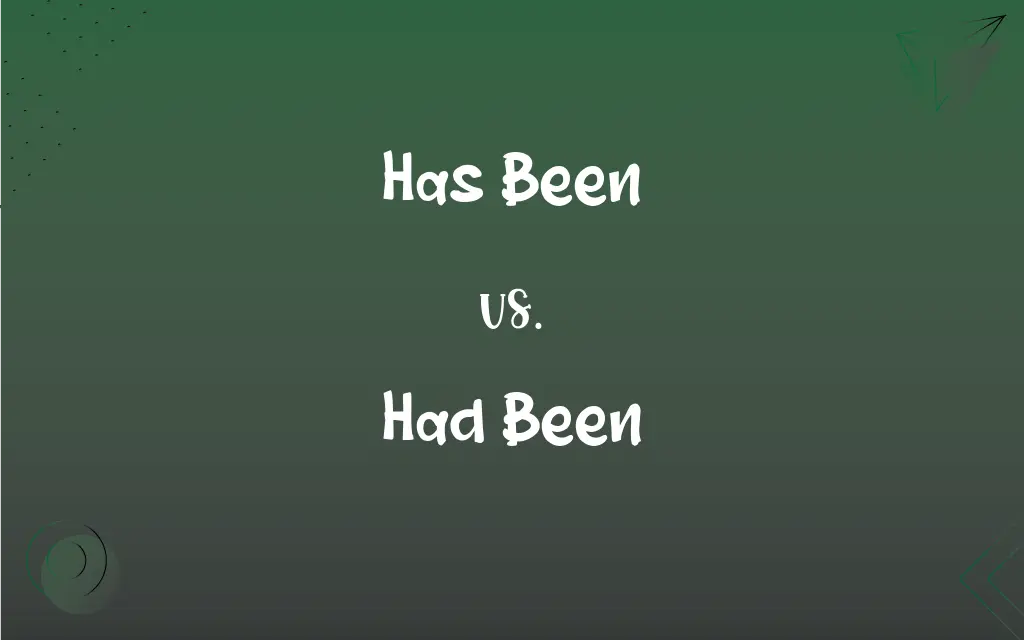Has Been vs. Had Been: What's the Difference?
Edited by Aimie Carlson || By Janet White || Published on January 16, 2024
"Has been" is present perfect tense, indicating an action started in the past and still relevant; "had been" is past perfect, for actions completed before another past event.

Key Differences
"Has been" is used in the present perfect tense, signaling an action or state that started in the past and continues into the present or has current relevance. "Had been," in the past perfect tense, denotes an action or state that was completed in the past, often before another past event.
"Has been" implies a connection between past and present, such as ongoing states or events with present effects. "Had been," however, is used to discuss past events that were completed before another event, emphasizing a sequence of actions in the past.
When using "has been," the focus is often on the result or current state arising from past actions. In contrast, "had been" places emphasis on the completion of an action before another past moment, with less direct relevance to the present.
"Has been" is commonly used in situations where the time period is not closed, like life experiences or ongoing situations. "Had been" typically refers to actions in a closed time period, before a specific point in the past.
Examples of "has been" include situations or states continuing up to now, like careers or studies. "Had been" is used for actions or states that were true up to a past point, often in storytelling or history.
ADVERTISEMENT
Comparison Chart
Tense
Present Perfect
Past Perfect
Time Frame
Past to Present
Past before Past
Focus
Continuity or Current Relevance
Completion before another past event
Typical Use
Ongoing actions or states
Actions or states completed in a specific past
Example Context
"He has been working there for five years."
"He had been working there before he resigned."
ADVERTISEMENT
Has Been and Had Been Definitions
Has Been
Describes an experience or condition that started in the past and may still exist.
It has been raining since morning.
Had Been
Used to express the completion of an action before a past reference point.
The team had been practicing hard before the championship.
Has Been
Refers to a state or action relevant to the present.
He has been a teacher for twenty years.
Had Been
Indicates an action or state completed before another past event.
They had been married for ten years before they separated.
Has Been
Used to talk about past actions affecting the current situation.
The project has been delayed due to funding issues.
Had Been
Indicates past experiences or states that were true up to a certain past moment.
The building had been empty for months.
Has Been
Expresses the duration of an action or state up to now.
The museum has been closed for renovations.
Had Been
Describes a past action or state that occurred over a period before another past time.
He had been working there for a year when he got promoted.
Has Been
Indicates an action started in the past and continuing to the present.
She has been studying for three hours.
Had Been
Refers to a past condition or action relevant to a specific moment in the past.
She had been asleep when the phone rang.
Has Been
One that is no longer famous, popular, successful, or useful.
Has Been
(pejorative) A person, especially one formerly popular or influential, who continues in their field after their popularity or effectiveness has peaked and is now in decline.
Has Been
Someone who is no longer popular
FAQs
What tense is "has been"?
Present perfect tense.
Is "has been" used for recent events?
Yes, particularly if they're still relevant.
When do you use "had been"?
For actions completed before another past event.
What tense is "had been"?
Past perfect tense.
Can "has been" imply ongoing actions?
Yes, it often does.
Is "had been" used for distant past events?
Typically, especially before another past event.
How does "had been" relate to the past?
It indicates actions completed in a specific past.
Can "had been" describe a former state?
Yes, a state existing before another past time.
What is an example of "has been" in a sentence?
"She has been living in Paris for five years."
When do you use "has been"?
For actions or states continuing from past to present.
Does "had been" refer to completed actions?
Yes, completed before another past time.
Can "has been" describe a current state?
Yes, resulting from past actions.
Is "has been" common in spoken English?
Yes, especially in conversations about experiences.
Is "had been" common in written English?
Yes, particularly in narrative or historical writing.
Does "had been" suggest a sequence?
Yes, a sequence of events in the past.
How does "has been" relate to the present?
It shows past actions affecting the present.
Does "has been" suggest continuity?
Yes, from past to present.
Can "had been" be used in questions?
Yes, for actions before a past reference point.
Can "has been" be used in questions?
Yes, for current relevance of past actions.
What is an example of "had been" in a sentence?
"He had been a doctor before he retired."
About Author
Written by
Janet WhiteJanet White has been an esteemed writer and blogger for Difference Wiki. Holding a Master's degree in Science and Medical Journalism from the prestigious Boston University, she has consistently demonstrated her expertise and passion for her field. When she's not immersed in her work, Janet relishes her time exercising, delving into a good book, and cherishing moments with friends and family.
Edited by
Aimie CarlsonAimie Carlson, holding a master's degree in English literature, is a fervent English language enthusiast. She lends her writing talents to Difference Wiki, a prominent website that specializes in comparisons, offering readers insightful analyses that both captivate and inform.































































